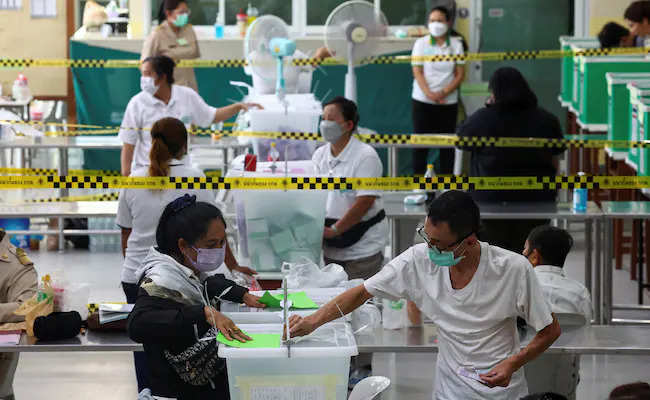Voters reject the army-backed government, giving Thailand's opposition a major victory.

Bangkok: In a drive to end nearly ten years of conservative, army-backed rule, Thailand's opposition won a shock election victory on Sunday by trouncing parties affiliated with the military, setting the stage for a flurry of deal-making over creating a government.
With 99% of the votes counted, the liberal Move Forward Party and the populist Pheu Thai Party were far ahead, but it was far from clear that either would form the next government due to parliamentary procedures that were drafted by the military after its coup in 2014.
To win power, the opposition parties will need to reach agreements and assemble a wide range of allies, including senators nominated by the junta who have sided with military parties and who will vote on the future prime minister and the composition of the government.
To win power, the opposition parties will need to reach agreements and assemble a wide range of allies, including senators nominated by the junta who have sided with military parties and who will vote on the future prime minister and the composition of the government.
The election on Sunday was the most recent round in a protracted power struggle between Pheu Thai, the populist juggernaut of the wealthy Shinawatra family, and a grouping of old money, conservatives, and military figures with sway over important institutions at the centre of two decades of unrest.
Yet after nearly sweeping the capital Bangkok on a programme of institutional change and destroying monopolies, Move Forward's stunning success, riding a surge of support from young voters, will put Thailand's establishment and ruling parties to the test.
According to the preliminary data, Pheu Thai was closely followed by Go Forward in order of success. These parties were predicted by Reuters to win more than triple the number of seats held by United Thai Nation, which was supported by the army, and Palang Pracharat, the junta's political vehicle.
Pita Limjaroenrat, the leader of Move Forward and a 42-year-old former executive of a ride-hailing firm, called the result "sensational" and vowed to uphold his party's principles when establishing a government.
He assured reporters that the opposition parties will be backed by the military and opposed to the dictator. The possibility of minority governance is presumably no longer viable in Thailand.
Although he stated that he was still open to an alliance with Pheu Thai, he had his sights set on the position of prime minister.
He wrote on Twitter that it was "clearly apparent" that the Move Forward Party had garnered a great deal of support from citizens all around the nation.
The military and its allies will be devastated by the preliminary findings. Nonetheless, they might still play a part in politics if parliamentary procedures were on their side and powerful individuals worked behind the scenes to support them.
After serving as prime minister for nine years and leading the most recent coup, retired general Prayuth Chan-ocha ran on the platform of continuity, warning that a change in leadership could spark unrest.
On Sunday, he discreetly left the United Thai Nation party office where few of his followers could be seen.
A large television screen displayed a live speech by Move Forward's leader as a small group of staff members sat next to plates of unfinished meals.
Prayuth told reporters, "I wish for the prosperity and peace of the nation. "I value democracy and the electoral process. I'm grateful."
Given that Pheu Thai had won the majority of votes in every election since 2001, including two landslides, it was expected that she would prevail. Its three remaining regimes have all been overthrown.
Thaksin Shinawatra, the divisive self-exiled businessman who founded Pheu Thai, was depending on a wave of nostalgia for its populist policies, including affordable healthcare, microloans, and substantial farming subsidies, to sweep it back to power in a landslide.
Given that Pheu Thai had won the majority of votes in every election since 2001, including two landslides, it was expected that she would prevail. Its three remaining regimes have all been overthrown.
Thaksin Shinawatra, the divisive self-exiled businessman who founded Pheu Thai, was depending on a wave of nostalgia for its populist policies, including affordable healthcare, microloans, and substantial farming subsidies, to sweep it back to power in a landslide.
Paetongtarn, the 36-year-old daughter of Thaksin, is widely expected to succeed her father and her aunt Yingluck Shinawatra as prime minister. Both Yingluck and Thaksin were deposed in coups.
Paetongtarn expressed her happiness for Move Ahead but noted that it was too early to talk about coalitions.
Move Forward was betting that 3.3 million first-time voters would support its liberal agenda, which included proposals to reduce the military's political influence and alter a strict law on royal insults that detractors claim is used to stifle dissent. Move Forward saw a late-stage rally in opinion polls.
The rise of Move Forward, according to Chulalongkorn University political scientist Thitinan Pongsudhirak, signalled a significant change in Thai politics.
.png)